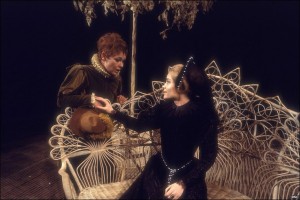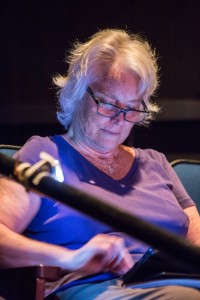Twelfth Night – Lisa Harrow
 Lisa Harrow is a renowned RSC actress recognized for a career that encompasses stage, film and television both internationally and in the U.S. She taught a hugely successful Master Class for Portland Shakespeare Project in 2014 — which led to her return this season as 2015 Artist in Residence with the company. Ms. Harrow’s association with Portland and PSP began thanks to Co-Artistic Director Grant Turner, who first contacted her to do workshops for Northwest Classical Theatre Company three years ago. We talked to Ms. Harrow about ‘Twelfth Night,’ directing, and love in all its many guises.
Lisa Harrow is a renowned RSC actress recognized for a career that encompasses stage, film and television both internationally and in the U.S. She taught a hugely successful Master Class for Portland Shakespeare Project in 2014 — which led to her return this season as 2015 Artist in Residence with the company. Ms. Harrow’s association with Portland and PSP began thanks to Co-Artistic Director Grant Turner, who first contacted her to do workshops for Northwest Classical Theatre Company three years ago. We talked to Ms. Harrow about ‘Twelfth Night,’ directing, and love in all its many guises.
People are thrilled that you’re back with Portland Shakespeare Project again this year.
Were you part of the decision that the show you’d direct would be Twelfth Night? Or did Michael Mendelson (PSP Artistic Director) come to you with the play.
No, they had decided that that’s what they were going to do. It was all because of the workshop last season. Michael said “my god you should be a director.” And I said “well, I don’t know about that.” And he said “well this is the whole thing we’re doing.”
Of course, I had been in this wonderful production of Twelfth Night in 1969 at the Royal Shakespeare Company (RSC) in England. It was my first job out  of drama school, I was 25 years old, and I was cast as Olivia opposite Judy Dench playing Viola and there was this amazing group of older, deeply experienced actors. As a 10-year-old in New Zealand, I’d conceived this passion for Shakespeare and decided that’s all I wanted to do all of my life, was to actually be at Stratford. So suddenly there I was and doing the only thing that was important in my life
of drama school, I was 25 years old, and I was cast as Olivia opposite Judy Dench playing Viola and there was this amazing group of older, deeply experienced actors. As a 10-year-old in New Zealand, I’d conceived this passion for Shakespeare and decided that’s all I wanted to do all of my life, was to actually be at Stratford. So suddenly there I was and doing the only thing that was important in my life
We did the play for three years; it was the most beautiful production. People still say to me it was the best Twelfth Night they ever saw. I don’t know because I’ve never seen the play since.
Since 1973, I’ve had absolutely no experience with Twelfth Night whatsoever, but I knew the play so well, because it was my first experience of playing a leading Shakespearean role in a company and at that level.
And so I said OK, I’ll do Twelfth Night. Because Michael is very persuasive, you know. [laughter] And he kept telling me how great it would be for me to read with it, the experience of Twelfth Night.
And I must say during the auditions, which I had a wonderful time doing, I cried most of the time, because I was remembering what it was when I was twenty-five doing it, and kept constantly putting myself in their shoes. And so that’s why I’m doing it
Did I understand you to say you’ve never seen Twelfth Night?
I’ve literally not wanted to. It (the RSC production) was such an extraordinary experience.
I worked with this extraordinary genius called John Barton who was so wonderful and so demanding of his actors that where the words come from in terms of the thought that expresses them is so complex and deep.
I mean, he would come in on the last night of a show that had run for three years and give you notes because you still hadn’t quite got it right.
And so I get angry – not angry, that’s too strong a word – but I do get irritated by going to Shakespeare where people just don’t know what they’re saying and people do things for effect. And there’s a kind of wash over of pizazz and everyone says “oh, wow, that was great” but they don’t know what the individual characters affect.
So part of it is that, part of it is I’ve been working. Part of it is a lot of the time I was never anywhere where Twelfth Night was being done.
But I actually chose, I think – although I’ve never questioned it until now – but as I think about it, that production we did was so wonderful I didn’t want it spoiled.
That’s very arrogant on my part.
I understand that impulse — when it’s been so soul-filling, a life altering experience, it’s something you want to hold close.
It wasn’t until I started thinking about the play and Michael started saying to me, what period are you going to set it in and then I realized I hadn’t seen another production. So therefore, for me the only period it could be set in was Elizabethan.
But of course, it’s because it’s about the turning point in Elizabethan society from the traditional Medieval, Middle Ages view of the house where everyone had their place and their station in the world and no one stepped outside that.
And Twelfth Night is all about people stepping outside their given role in the natural order of things according to the Elizabethan societal structure. So you can’t put it in the twenties, and you can’t put it in the fifties because those things didn’t matter anymore.
But the idea was that only members of aristocracy could wear velvet or could wear a particular kind of costume or a particular kind of color. And then suddenly someone like Malvolio, who is basically a working man, steps up and steps out of his class and assumes the mantle of the aristocracy; that is a killable offense. You cannot do that.
Twelfth Night is all about that night in the calendar year when everything goes topsy-turvy. These days anything goes, but in those days it didn’t. And you need to put it in that context.
I know it was an absolute, “Oh my god, Elizabethan.” But Sarah (Gahagan) has done an amazing job with costumes.
 Would you call yourself a purist when comes to Shakespeare or do you have no problem, depending on the production, setting it in another period.
Would you call yourself a purist when comes to Shakespeare or do you have no problem, depending on the production, setting it in another period.
As long as it doesn’t diminish the play it’s fine.
I did wonder at Ian McKellen’s Richard III, putting it into Nazi Germany.
But a play like Hamlet in many ways – because it’s timeless sense of identity is so strong, “who am I, what am I, what am I doing” – is more generic. The Tempest as well. Those plays can be, I think, more timeless.
But Twelfth Night, because it’s set in a little house, in a household, and it’s all about the societal structure specifically and it’s a very tight knit group of people who are all interacting – well, to me, you’d have to set it in another society, another time where the aristocracy is absolutely a given.
I’ve seen the costume renderings. They look gorgeous, just lush.
All the production work that the company is doing is just terrific. I couldn’t be happier. The amount of creativity that’s happened is just fantastic.
From where we sit today, there’s a certain romanticism that we maybe apply to the Elizabethan period. Can you speak to the themes of love that run throughout the play.
Not romantic love.
Right. All forms of love in Twelfth Night.
I can speak to it with a general statement.
The general idea of Twelfth Night is that it’s a comedy. To me it’s not a comedy. It’s very funny, but there are some extraordinarily dark, obsessive elements of it. There’s Orsino’s obsessive love for Olivia, which has got nothing to do with her but is to do with the actual courtly image of being in love. A gentleman had to be in love, and so he’s in love with the concept of love until finally Viola teaches him that there’s a more direct way to love and that’s actually to be in love with somebody.
There’s Malvolio’s obsessive love with Olivia. There’s Olivia’s obsessive love with Cesario. There’s Antonio’s obsessive love with Sebastian. And then there’s Maria’s forlorn and secret love of Sir Toby.
The fundamental driving passion in the play is love. Oh, and then there’s the love of the brother and the sister, and there’s Olivia’s love for her dead brother.
But the yearning for love drives some of the characters into doing some extreme and dangerous things. And there is a dark underbelly of the play, which is almost murderous. It’s an interesting thing.
To me the thing about directing the play is just getting people into that place where their love is so obsessive that it’s driving them crazy. That along with the love comes the madness.
Temporary but complete
So it’s not romantic.
There’s yearning, which of course is romantic love. But not hearts and flowers.
There’s pain and anger. It’s anguish, it’s crying, it’s hopelessness, it’s yearning, it’s all of those things. It’s unrequited love really. Until, finally, the resolution happens. And then it’s hearts and flowers, only it’s for the last two minutes of the play.
One last thing. Music plays a role in Twelfth Night. Can you speak to its use and how it’s threaded through this particular production.
 Allen (Nause) is playing Feste and has three songs to sing and he’s doing them beautifully, playing the traditional Elizabethan tunes.
Allen (Nause) is playing Feste and has three songs to sing and he’s doing them beautifully, playing the traditional Elizabethan tunes.
The other music, we’re working on. There aren’t many twelve string lute players available to Portland Shakespeare Project.
Of course it’s a central part to the play. I’ve been communicating with friends from RSC. We’re working on it. That’s something I’m having to rely on my knowledge of. Because it’s Elizabethan, I don’t want someone playing a modern sound, because it’s so important. Particularly the first song that introduces the play.
Orsino is the Duke of Illyria, he is the highest social point of the play, he is at the peak of the social structure. And his perception of music would be like someone going to high opera today. There’s no sense of the commonplace in his music. We need a sound that gives that sense of pure, intellectual, classic, educated training. You can’t just plunk in any old thing. It’s got to be specific to his social stature.
And he would have had his own group of musicians. And of course, in Elizabethan theatre, they would have all been on stage – so we’re doing our best to evoke that. And I think we’re going to be successful.
Allen is doing a fabulous job. What an asset he is to this company. He’s tremendous.
And it’s so wonderful to have Allen and Michael and Jim (Butterfield) and David (Bodin) there for the younger actors to work with. Because I’m a great believer in older actors being there to help and nurture the younger ones coming along.
Acting is a craft and mostly, I believe, it’s best taught when younger actors learn from older actors. Because the older actors have had the experience and they know what works and what doesn’t.
I agree wholeheartedly. I know they’re learning so much from you as well.
Well, I don’t know about that. But anyway I’m trying my best to teach them what I know, yes. It’s what you have to do, it’s your job. Well, that’s the human condition, isn’t it.
Twelfth Night runs July 8 – August 2, 2015. Purchase tickets here.
